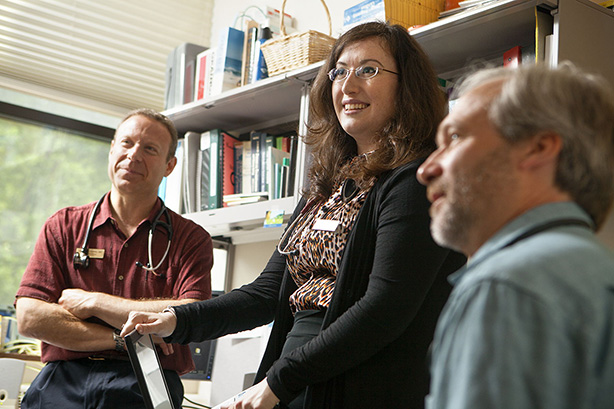END NOTE

Dr. Anne Jones '04, center, with fellow Gannett Health Services physicians Dr. Edward Koppel, interim medical director, left, and Dr. Kenneth Hill, right.
Physician is drawn to Cornell's public health approach
Cornell taught me many life lessons. Chief among them was the notion that with thought and purpose, our work can impact something greater than ourselves.
Examples of this concept abounded. I remember professors, award-winning experts in their fields, who inspired others to achieve excellence for the good of the national and international community. The Cornell University Chorus (of which I was a member) and Glee Club made trips several times a year to Ithaca nursing homes, bringing our music to those who couldn't easily come to our concerts. And who could forget Commencement, when we looked across the stadium and together sang the "Evening Song" and alma mater? I was struck then by the realization that the Cornell community was much larger than the people in the stadium that day. The true Cornell connection was beyond what I could hold; it had become something that held me and has continued to grow within me as an alumna.
So it was with a spirit of service to a community I love that I returned to The Hill this summer as assistant director for medical services at Gannett Health Services. As an osteopathic family physician with public health training and a passion for primary care, I constantly see the connections between the concerns that bring my patients to the office and the communities in which they live. Rarely does health care allow the opportunity to address those connections in a practical or holistic fashion. Yet that is precisely the model that Gannett has been developing for more than a decade at Cornell.
I was drawn back to campus and to this opportunity by a dedicated team of medical and mental health providers driven by a commitment to caring for the whole student (body and mind), as well as the whole "student body"; and by an innovative health care organization that strives to understand and embrace the broad community to provide excellent care to each patient.
My experience in medicine has taught me that there are opportunities for impact at three broad levels: the individual, the system and the community.
We have an impact by putting the student – her needs, his values, the need to feel heard and cared for – at the center of the integrated team of clinicians, nurses and counselors.
We engage campus partners as "eyes and ears" who recognize students in distress, and by addressing actual or anticipated health concerns in the environment, such as high-risk drinking or emerging infectious disease.
The system helps drive the individual and community toward success. It defines the processes that facilitate timely and effective services: when, how and with whom students make appointments; whether they need specialty care; how a faculty member consults about a student of concern; and what issues can be addressed before they evolve into crises.
Most health systems in the United States are trying to figure out how to improve care for people – they are struggling to define their populations, understand the primary needs of its individuals and design systems to create healthier communities. At Gannett, we are in an ideal position to develop integrated and efficient systems that facilitate a true amalgamation of primary care and public health. I look forward to working with my colleagues to continue to develop a model that supports the health of the Cornell community and may offer ideas for a troubled national health care system.
What has it been like to return to The Hill in this new role? Well, it's like coming home every day, yet seeing the campus with a new set of eyes. This is the place that first shaped my professional interests. It now offers me the opportunity, with thought and purpose, to impact something greater: the implementation of an approach to health care that helps individuals and communities to thrive.
Anne C. Jones '04 received a D.O. from the University of Medicine and Dentistry of New Jersey – School of Osteopathic Medicine and an M.P.H. from The Dartmouth Institute for Health Policy and Clinical Practice. She began work at Gannett Health Services in June 2013 after completing the national Veterans Administration Quality Scholars Fellowship program.